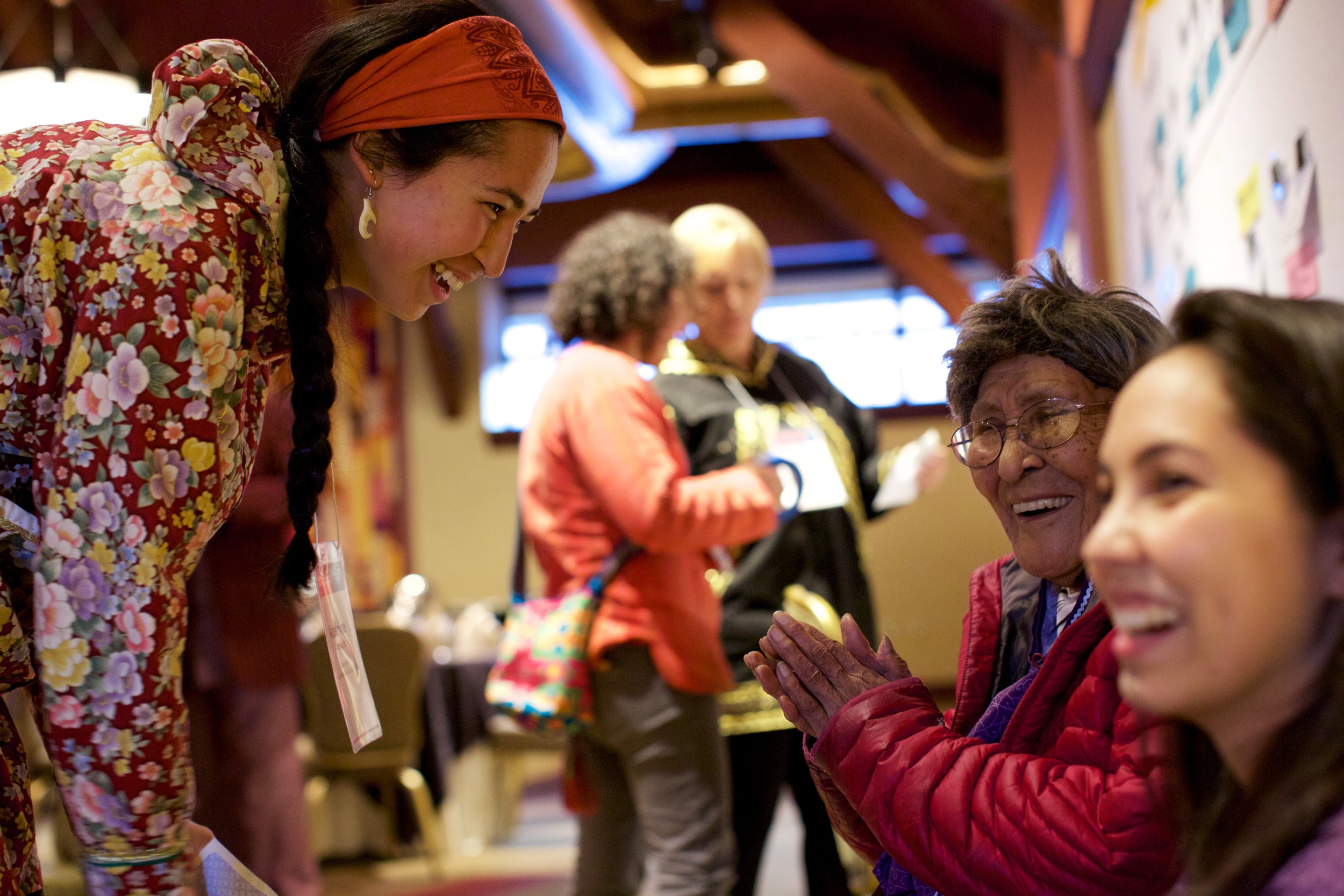In October 2018, CJRF co-sponsored a historic gathering: the First Peoples’ Convening on Climate-Forced Displacement with the Unitarian Universalist Service Committee (UUSC) and the Alaska Institute for Justice. Held in Girdwood, Alaska, the three-day conference brought together more than 60 community leaders and advocates from around the world to address how climate change is forcing indigenous communities off their land.
At the end of the gathering, CJRF Director Heather McGray sat down with Alaska Institute for Justice’s (AIJ) Executive Director Robin Bronen, Research Director Denise Pollock, Research Assistant Adelaine Ahmasuk, and Government Relations Specialist Kate Glover, to hear their reflections on the conference. The conference was linked to an on-going program by AIJ to support Alaska Native coast villages that are considering whether and how to relocate.
Pictured here Adelaine Ahmasuk (AIJ), Cecilia Smith (Kingikmiut Dancers and Singers of Anchorage), and Denise Pollock (AIJ). Picture courtesy of AIJ.
CJRF: What do you love about the communities you partner with and the work you do?
Denise Pollock: My family comes from Shishmaref, Alaska. I work directly with the 15 Alaska Native communities that AIJ partners with, Shishmaref being one of them. We provide resources for communities to monitor and document erosion, flooding, storms, and permafrost thaw long-term. This data provides the foundation to create a relocation governance framework, which indicates the threshold at which communities must protect in place and/or relocate, that is centered in human rights and tribal self-determination.
Adelaine Ahmasuk: I come from Nome, Alaska. I love my co-workers and the fact that we are very strong and powerful women. That was something I looked for [in a job]. Also, we work directly with the communities. For me, it’s important to give them their own voice in tribal sovereignty and decision-making.
Kate Glover: I love that we work at the intersection of climate change and human rights. We help communities help themselves and protect the lifestyle that is so important to who they are.
Robin Bronen: Human rights have to be at the forefront of how we respond to the climate crisis, and the laws and policies that have oppressed people cannot be what guides us into the future. We are in the middle of a transformation, and there’s all this hope about what we can create with this intersection of human rights and communities and justice.
CJRF: Can you briefly introduce the event we just concluded? What was it, why did it happen, and why did it matter?
Robin Bronen: We just participated in the first convening on climate-forced displacement with communities from Alaska, the South Pacific, Bangladesh, Louisiana, and Washington State. One of the most important things I heard was that it’s really important for communities not to feel alone. There is solidarity and tremendous strength and courage in responding to the crisis of what is happening in regard to our climate. Now there is a collective of people working together to envision the future they want as the climate continues to change.
CJRF: What you will take back to your work at AIJ after this convening?
Kate Glover: A major component is looking at the laws and policies to identify the barriers that prevent communities from getting the funding and resources they need. Then, helping communities make changes that will help them better access the resources that they need.
CJRF: Share one fun thing from this week, or one interesting story you heard.
Denise Pollock: It was a real honor for my Iñupiaq dance group, the Kingikmiut Dancers and Singers of Anchorage, to be able to share our Iñupiaq dances with everyone. Whenever we introduce dancing with our communities it really brings people to life. There’s a sense of healing when our dances and our songs are shared that really helps to bring everyone together. There are many reasons to feel sadness or trauma in light of relocation, but we always need to counterbalance that with the things that help release our stress and our grief and give us the energy to move forward.
Adelaine Ahmasuk: The cultural sharing of the traditional knowledge between the South Pacific, Louisiana, Bangladesh and Alaska: I was amazed to see everybody’s responses, and every time you told a story somebody from a different culture or location was so intrigued by what we do and where we come from. For me that was really interesting to share who we are and listen to who people are also.
Robin Bronen: Gratitude. I feel so much gratitude that this [the conference] happened. The gratitude of people being so willing to share their wisdom and knowledge and stories to create one story. There was so much love that was present, and honoring of each other and each other’s journey.
Interviews have been edited for clarity and length.

